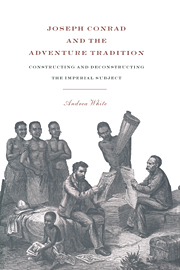Book contents
- Frontmatter
- Contents
- Acknowledgments
- Introduction
- 1 Constructing the imperial subject: nineteenth-century travel writing
- 2 Adventure fiction: a special case
- 3 Them and us: a useful and appealing fiction
- 4 The shift toward subversion: the case of H. Rider Haggard
- 5 Travel writing and adventure fiction as shaping discourses for Conrad
- 6 Almayer's Folly
- 7 An Outcast of the Islands
- 8 The African fictions (I): “An Outpost of Progress”
- 9 The African fictions (II): “Heart of Darkness”
- Coda
- Notes
- Bibliography
- Index
2 - Adventure fiction: a special case
Published online by Cambridge University Press: 10 December 2009
- Frontmatter
- Contents
- Acknowledgments
- Introduction
- 1 Constructing the imperial subject: nineteenth-century travel writing
- 2 Adventure fiction: a special case
- 3 Them and us: a useful and appealing fiction
- 4 The shift toward subversion: the case of H. Rider Haggard
- 5 Travel writing and adventure fiction as shaping discourses for Conrad
- 6 Almayer's Folly
- 7 An Outcast of the Islands
- 8 The African fictions (I): “An Outpost of Progress”
- 9 The African fictions (II): “Heart of Darkness”
- Coda
- Notes
- Bibliography
- Index
Summary
Once more the spirit of the age has found literary expression and the result is a whole revolving bookcase of literature charged with the spirit of imperialism.
(Blackwood's Edinburgh Magazine, February, 1899)Closely related to travel writing was the adventure fiction of the day. In fact the line between the two discourses was often a thin one. Both constructed the imperial subject similarly, applauding the same heroic virtues of pluck and forthrightness in the conqueror, Othering the native in familiar ways, and making use of similar expressions, images, and plots. As Martin Green demonstrates, Victorian adventure fiction chronicled, as did the travel writing we have just looked at, “dreams of adventure and deeds of empire.” Both genres were tremendously popular, and both were well represented, side by side, in the flourishing periodical literature of the day. The reviewer quoted above, in Blackwood's celebratory millenial number, refers to works by such popular writers as W. W. Jacobs and Rudyard Kipling, and to Henry Newhall's Drake's Drum as examples of the current interest in books “charged with the spirit of imperialism.” He also recommends a Mr. Vandervell's Shuttle of an Empire's Loom in which the British tar is depicted as having “unfailing pluck” and “indomitable good-humour” (p. 264), a familiar formula in travel writing and adventure fiction alike.
- Type
- Chapter
- Information
- Joseph Conrad and the Adventure Tradition , pp. 39 - 61Publisher: Cambridge University PressPrint publication year: 1993



